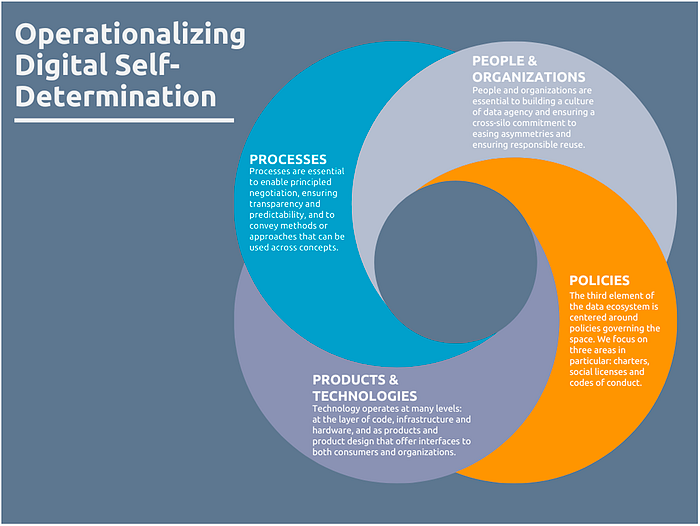Actualizing Digital Self Determination: From Theory to Practice
The world is undergoing a rapid process of datafication, providing immense potential for addressing various challenges in society and the environment through responsible data reuse. However, datafication also results in imbalances, asymmetries, and silos that hinder the full realization of this potential and pose significant public policy challenges.
In a recent paper, I suggest a key way to address these asymmetries–through a process of operationalizing digital self-determination. The paper, published open access in the journal Data and Policy (Cambridge University Press), is built around four key themes:
- Data reuse, facilitated by open data and data collaboratives, has the potential for public interest outcomes and benefits in research, problem-solving, and decision-making. However, data, information, and especially agency asymmetries hinder the realization of these benefits. Among other problems, data is often hoarded in silos, transparency is lacking, and vulnerable individuals, such as children or migrants, have little control over their data. These asymmetries result in negative consequences such as unrealized public benefits, biased analysis, extractive relationships, and an erosion of public trust.
- Existing methods to address agency asymmetries, such as informed consent, have their limitations. Consent is often presented as a binary choice; in fact, the issue requires a more nuanced approach, one that takes into consideration the need for more comprehensive information, and that focuses on collective interests alongside those of individuals. Furthermore, existing methods of consent struggle with the potential of data repurposing and data reuse making it difficult to fully realize the public benefit potential of data. Alternative mechanisms–e.g., data ownership rights, co-operatives, and personal information management systems (PIMS) — do exist, but they do have their shortcomings, including concerns about commodification, the lack of enforceable legal frameworks, and challenges associated with the transfer of data control to large operators.
- To unlock the true potential of data and address asymmetries, a new principle of digital self-determination (DSD) is needed. DSD builds upon the intellectual traditions of self-determination, incorporating principles related to autonomy and agency from philosophy, psychology, and legal theory. It emphasizes the importance of respecting, embedding, and enforcing individual and community agency, rights, interests, preferences, and expectations throughout the data life cycle. DSD focuses on agency over data, encompassing both individual and collective dimensions, and seeks to protect the rights of marginalized and disenfranchised populations while addressing digital asymmetries. It emphasizes flexibility, context-specific approaches, and voluntary, participatory methods based on principled negotiation.
- Operationalizing DSD requires translating theoretical concepts into practical implementation. The paper proposes a four-pronged framework that covers processes, people and organizations, policies, products and technologies:
- Processes include citizen engagement programs, public deliberations, and participatory impact assessments, can inform responsible data use.
- People and organizations, including data stewards and intermediaries, play a vital role in fostering a culture of data agency and responsible data reuse.
- Effective governance and policies, such as charters, social licenses, and codes of conduct, are key for implementing DSD.
- Finally, technological tools and products need to focus on trusted data spaces, data portability, privacy-enhancing technologies, transparency, consent management, algorithmic accountability, and ethical AI.

Implementing DSD will require collaboration among various stakeholders, including policymakers, data practitioners, technology developers, civil society organizations, community leaders, and citizens themselves. By embracing the principle of DSD and implementing the proposed framework, we can foster innovation in the reuse of data for public decision-making, protect the rights of communities and individuals, and create a more equitable and responsible digital era.
To advance both collaboration and implementation, the International Network on Digital Self Determination was created. To learn more about how to advance digital self-determination, visit the website HERE.
